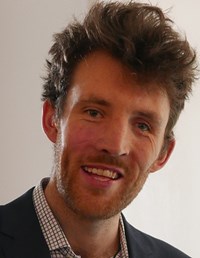Andy Ruck

Presentation
I am a postdoctoral researcher working on the SHOWCASE project, which explores ways in which biodiversity-friendly practices might be better integrated into European farming. My focus within the project is on farmers’ attitudes towards biodiversity-friendly farming, and how this may be influenced by participation in ‘citizen science’ approaches to monitoring farmland biodiversity.
Research
The EU Horizon 2020-funded SHOWCASE project explores how biodiversity conservation might be better integrated into agricultural systems across Europe, and involves partners in fifteen European countries. As a social scientist, my focus within the project is on farmers’ attitudes towards biodiversity-friendly farming and the remaining barriers to their adoption of it, and ways of bridging gaps between the knowledge and attitudes of farmers and ecologists. Specifically, I am assessing whether farmers' participation in ‘citizen science’ approaches to biodiversity monitoring serves to influence their attitudes towards biodiversity. I am also in the process of reviewing existing citizen science approaches to monitoring farmland biodiversity. Within SLU, I work closely on these tasks with Erik Öckinger and René van der Wal.
Previously, I worked at the Centre for Mountain Studies – an interdisciplinary research centre in Scotland focused on the sustainable development of rural and mountain areas. At the CMS, I worked on several parallel projects that continued the ‘participatory’ theme identified above. These included SCITOUR, which focused on the inclusion of science communication and scientific data collection within tourism experiences; and an evaluation of Volunteer Cairngorms – an environmental volunteering programme within the Cairngorms National Park. My PhD research, completed in 2019, focused on young people’s lived experience of a nationwide, school-linked conservation and citizen science project called Polli:Nation. In particular, I explored the ways in which ‘lived curricula’ were produced by the coming-together of diverse elements within the project - young people, teachers, visiting experts, and more-than-human elements.
Background
While there are (hopefully) clear themes running through my previous research, I have a somewhat diverse academic background, with a Master of Research in Social Anthropology, a PhD in Education, and now a postdoc position in a Department of Ecology. This will (hopefully) serve me well for interdisciplinary working during the SHOWCASE project!
Selected publications
Ruck, A. (2021) Experts, Insects and Informality: Three Key Features within a School-linked Conservation Initiative. Environmental Education Research. https://doi.org/10.1080/13504622.2021.1978940
Ruck, A. and Mannion, G. (2021) Stewardship and Beyond? Young People’s Lived Experience of Conservation Activities in School Grounds. Environmental Education Research. https://doi.org/10.1080/13504622.2021.1964439
Robertson, T., Docherty, P., Millar, F., Ruck, A. and Engstrom, S. (2021). Theory and Practice of Building Community Resilience to Extreme Events. International Journal of Disaster Risk Reduction. https://doi.org/10.1016/j.ijdrr.2021.102253
Ruck. A. (2020). ‘Overtourism’ on Scotland’s North Coast 500? Issues and Potential Solutions. In Seraphin, H., Gladkikh, T., and Tan, V.T. (eds.) Overtourism - Causes, Implications and Solutions. Palgrave MacMillan. https://link.springer.com/chapter/10.1007/978-3-030-42458-9_13
Roche, J., Bell, L., Galvão, C., Golumbic, Y., Kloetzer, L., Knoben, N., Laakso, M., Lorke, J., Mannion, G., Massetti, L., Mauchline, A., Pata, K., Ruck, A., Taraba, P., and Winter, S. (2020). Citizen Science Meets Education and Learning: Converting Tensions into Synergies. Frontiers in Sociology 5, pp.1-10. https://doi.org/10.3389/fsoc.2020.613814
Ruck, A. (2019). Co-producing Curricula: Young People’s Lived Experience of School-linked Practical Conservation and Citizen Science. PhD Thesis, University of Stirling. Available here.
Ruck, A. and Mannion, G. (2019) Fieldnotes and Situational Analysis in Environmental Education Research: Experiments in New Materialism. Environmental Education Research 26 (9-10), pp.1373-1390. https://doi.org/10.1080/13504622.2019.1594172